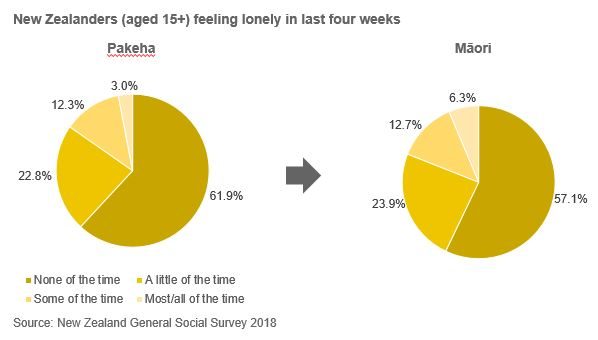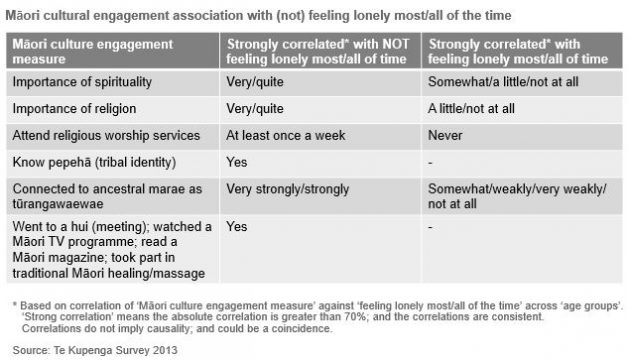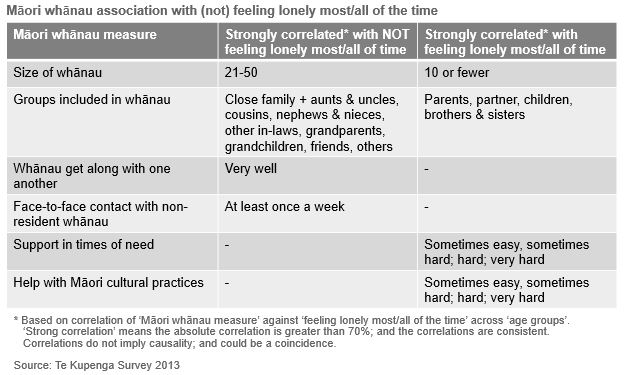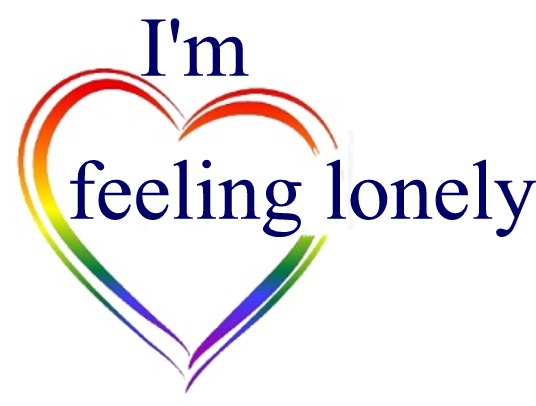Māori and lonely
Nau mai, Haere mai!
Briefly introducing us: One of our two Mokemoke Aotearoa founders has ancestral roots in Aotearoa, with his kaumutua having lived on the hillslopes of Roslyn in Dunedin. And the other has her ancestral roots spread afar as Kenya and Britain, and South Africa. We both miss our whānau who are now scattered over many countries. Being matua, home for us is where we spend time with our tamariki (growing up!), and so that is in Tāmaki Makaurau looking onto Rangitoto; and north enjoying the wonderful sea and hills around Tuparehuia.
We know for most of you, your pepehā is part of who you are…you acknowledge the importance that your ancestors and kaumutua have had in influencing who you are today. And we acknowledge that the wellbeing of your whānau is just as important as your own wellbeing… and you might even consider whānau ora as being most important.
So when your whānau is having problems we really expect that you might be deeply affected, and also if you are having problems your whānau too might be deeply affected. So ensuring that you and those around you are well is important to us. Ka whara te mokemoke i Aotearoa is important for us. So sometimes for you and your whānau to all be well, you have to be brave enough to acknowledge your own feelings – feelings that for whatever reason you have not been able to share with others… and have brought you loneliness.
If you are one of the Māori who feels lonely we show aroha! And if you know of someone who feels loneliness, then please read further. In fact even if you suspect others might be lonely, and they stubbornly say they aren’t, it’s worth understanding loneliness better.

Scratching the surface of being lonely
Just as you might find it hard to understand how people of other ethnicities might be lonely, it’s also hard for them to really grasp how very lonely you might be: what it’s like:
Facing bullies
... who constantly make rude comments about our people and way of life
Missing your childhood
... because you have to take on caring responsibilites so early in life
Missing Te Reo
... your whānau are so immersed in English they can barely speak our language
Being accused
... unfairly by the police just because you are Māori
Being adopted
... and you don’t know your identity
Being Māori gives rise to many challenges with regard to feeling lonely…
… and in addition to these, you undoubtedly identify with many of the same loneliness problems that aren’t related to ethnicity.
Prevalence of loneliness
If you’re feeling lonely, then you are not the only one. As a Māori, you are more likely to be lonely than your contemporary pākehā.
Māori have a higher prevalence of feeling lonely most/all of the time, feeling lonely some of the time, and feeling lonely a little of the time; when compared to pākehā (see the pie-chart).
Overall, almost half (43%) of you and your whānāu are feeling lonely at least a little of the time; which compares to a little over a third (38%) of pākehā.

Exposing loneliness

Equally, our analysis of the Te Kupenga Survey 2013 showed that if have a large wide whānau, get along well with them, are in face-to-face contact with them at least once a week, and it is not hard to get support in times of need or for cultural practices, then you are much more likely to not feel lonely most/all of the time. On the other hand, if your relationship with your whānau as determined by these measures is not strong, then you are much more likely to feel lonely most/all of the time (see second table).
If you’re not connected to your culture or whānau and feel lonely, then we are not here to judge you, and rather we understand and show empathy.

Feeling socially isolated occurs when people, like you, are not connected into their communities in a meaningful way. Society, other people and we ourselves unwittingly contribute to loneliness. To name a few, loneliness resulting from being Māori can be exacerbated when:
- Your workplace is run by Pākehā, and everything about it is Pākehā… with no Māori symbolism at all.
- More and more of your whānau are leaving to find work elsewhere, and the only times you see them in the Marae is for a tangi.
- You have to justify your identity as being Māori, just because your skin colour isn’t brown enough.
- There are so few Māori students in the tertiary organisation you feel you don’t fit in.
- The house is so overcrowded you really miss quality time with your māmā.
- Your whānau are fighting constantly and the bad blood between them is worsening.
These are very real issues for you;
and some are not quick fixes! So despite these challenges it’s vital you actively find ways to ensure that you – and those around you – are emotionally healthy.
Exhibiting signs of being lonely
Solitude is very important for people to reflect and to come to grips with their situation. Being lonely for short periods is also not necessarily unhealthy. What we are considering is the type of loneliness which is prolonged and might be damaging to an individual’s health and wellbeing.
Some people talk about their loneliness; other’s don’t; Some might not recognise that they are actually suffering from loneliness.
When people are already lonely, having people around you that you aren’t able to connect with on a deeper level, might even make your loneliness worse.
Research has shown that when socially isolated people aren’t getting enough regular human contact that can create problems with their family members and people who they do end up talking to.

This manifests behaviour such as:
- Withdrawing from your family… you are secretly ashamed of them, and you don’t feel you have a place anymore.
- Fighting back… you feel so hurt you aren’t able to keep silent anymore.
- Reckless driving … you’ve been drinking to numb the pain and you still have to get home.
- Quitting studies… you aren’t being supported at your school or at home.
- Thinking about suicide… you can’t cope with the demands everyone expects from you.
- Being hassled into joining a gang …you’re scared because you hate their activity but it’s safer to be on the inside.
These are just the surface of the ways you might be showing signs of being lonely… and that you could recognise in others.
So where to from here?
Conquering loneliness
We appreciate…
you all have a unique story.
How long you have been lonely; What you believe causes your particular loneliness; and what you have already tried to alleviate the loneliness.

To get to the heart of your loneliness we would like to get to know you!
Your personality, your eccentricities, and your values are all part of what makes you feel your loneliness more than some others.
Your next step
We appreciate the trust you would place in us to talk openly and frankly – so we promise no judgements – genuine empathy, respect and confidentiality.
Then when we have understood you better, we can help you move forward. Help you form better connections with your spread out communities, with your friends and your families…wherever they are in the world.
If you are ready to take the next step, click the button to get started addressing your loneliness:
People feel lonely for many reasons. To learn more about other minority and lonely categories, select one of the coloured boxes below, or scroll down the “I’m feeling lonely” menu.

With our help you can conquer your loneliness by taking better care of your inner self.
And we can conquer loneliness in New Zealand by better understanding and accepting each other.
So when you are ready…click here.
We look forward to hearing your view of the world!
Stats NZ (2014), “Te Kupenga 2013 (English) – corrected.” Download the data.
